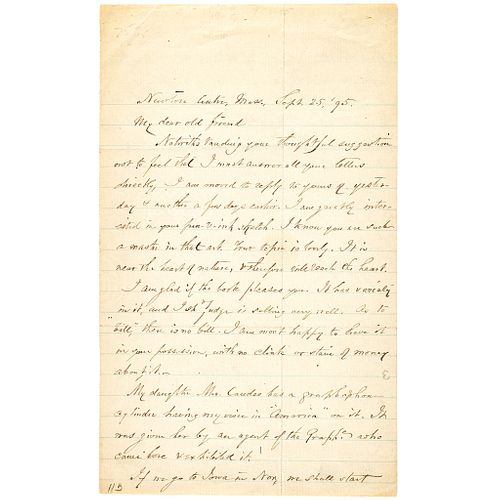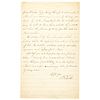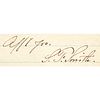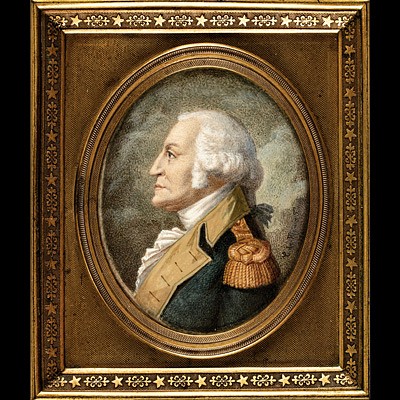SAMUEL FRANCIS SMITH Great Content - Autograph Letter Signed Regarding AMERICA
Lot 47
Estimate:
$3,000 - $4,000
Absentee vs Live bid
Two ways to bid:
- Leave a max absentee bid and the platform will bid on your behalf up to your maximum bid during the live auction.
- Bid live during the auction and your bids will be submitted real-time to the auctioneer.
Bid Increments
| Price | Bid Increment |
|---|---|
| $0 | $10 |
| $200 | $20 |
| $300 | $25 |
| $500 | $50 |
| $1,000 | $100 |
| $2,000 | $200 |
| $3,000 | $250 |
| $5,000 | $500 |
| $10,000 | $1,000 |
| $20,000 | $2,000 |
| $30,000 | $2,500 |
| $50,000 | $5,000 |
| $100,000 | $10,000 |
| $200,000 | $20,000 |
| $300,000 | $25,000 |
| $500,000 | $50,000 |
About Auction
By Early American History Auctions
May 22, 2021
Set Reminder
2021-05-22 12:00:00
2021-05-22 12:00:00
America/New_York
Bidsquare
Bidsquare : Autographs-Colonial-Political-Americana
https://www.bidsquare.com/auctions/early-american-history-auctions/autographs-colonial-political-americana-6913
302 Lots of Rare, Historic Autographs, Americana, Civil War Era, George Washington, Abraham Lincoln, Slavery & Black History, Revolutionary War Era, Colonial America, Federal Period, War of 1812, Colonial Currency, Indian Peace Medals & more... Early American History Auctions auctions@earlyamerican.com
302 Lots of Rare, Historic Autographs, Americana, Civil War Era, George Washington, Abraham Lincoln, Slavery & Black History, Revolutionary War Era, Colonial America, Federal Period, War of 1812, Colonial Currency, Indian Peace Medals & more... Early American History Auctions auctions@earlyamerican.com
- Lot Description
Autographs
1895 Samuel Francis Smith Great Content Autograph Letter Signed: "My daughter ... has a graphophone cylinder having my voice in 'America' on it." From Author of "America" a.k.a. "My Country 'Tis of Thee" Hears His Own Recording!
SAMUEL FRANCIS SMITH (1808-1895). American clergyman and poet, author of our nation hymn "America" (1832), otherwise known as 'My Country 'Tis of Thee'.
September 25, 1895-Dated, Autograph Letter Signed, "S. F. Smith", measuring 9" x 5.5", 2 pages, Newton Center, MA, Very Fine. Written on clean period light blue lined wove stationary paper in his fine writing. Here, Samuel Francis Smith writes to an unknown friend and correspondent his Letter reading, in part:
"My dear old friend, --- Notwithstanding your thoughtful suggestion not to feel that I must answer all your letters directly, I am moved to reply to yours of yesterday & another a few days earlier. I am greatly interested in your pen-&-ink sketch. I know you are such a master in that art. Your topic is lovely... My daughter Mrs. Caudee has a graphophone cylinder having my voice in "America" on it. It was given her by an agent of the Graph Co. who came here & exhibited it."
Apart from some light letterfolds and a trivial marginal split at bottom (none affecting or anywhere near the signature), this is a nice letter in a crisp, clear hand written in easily readable fine brown ink with a wonderful flowing signature "S. F. Smith" at the conclusion. A historic and exceedingly rare content ALS where Smith first hears his own voice via a Graphophone cylinder "having my voice in "America" on it"
The Graphophone was the name and trademark of an improved version of the phonograph. It was invented at the Volta Laboratory established by Alexander Graham Bell in Washington, D.C., United States. Extraordinary content.
Its trademark usage was acquired successively by the Volta Graphophone Company, then the American Graphophone Company, the North American Phonograph Company, and finally by the Columbia Phonograph Company (known today as Columbia Records), all of which either produced or sold Graphophones.
SAMUEL FRANCIS SMITH (1808-1895), while a student at Andover Theological Seminary, Smith gave Lowell Mason lyrics he had written and the song was first performed in public on July 4, 1831, at a children's Independence Day celebration at Park Street Church in Boston. The song, titled "America", was first published by Lowell Mason in The Choir in 1832. Smith later wrote an additional Stanza for the April 30, 1889 George Washington Centennial Celebration.
The Graphophone was the name and trademark of an improved version of the phonograph. It was invented at the Volta Laboratory established by Alexander Graham Bell in Washington, D.C., United States.
Its trademark usage was acquired successively by the Volta Graphophone Company, then the American Graphophone Company, the North American Phonograph Company, and finally by the Columbia Phonograph Company (known today as Columbia Records), all of which either produced or sold Graphophones.
In 1885, when the Volta Laboratory Associates were sure that they had a number of practical inventions, they filed patent applications and began to seek out investors. The Volta Graphophone Company of Alexandria, Virginia, was created on January 6, 1886, and incorporated on February 3, 1886. It formed to control the patents and to handle the commercial development of their sound recording and reproduction inventions, one of which became the first Dictaphone.
After the Volta Associates gave several demonstrations in Washington, D.C., businessmen from Philadelphia created the American Graphophone Company on March 28, 1887, to produce and sell the machines for the budding phonograph marketplace. The Volta Graphophone Company then merged with American Graphophone, which itself later evolved into Columbia Records.
The Howe Machine Factory (for sewing machines) in Bridgeport, Connecticut, became American Graphophone manufacturing plant. Tainter resided there for several months to supervise manufacturing before becoming ill, but later went on to continue his inventive work for many years. The small Bridgeport plant, which initially produced three or four machines a day, later became the Dictaphone Corporation
Our Auction Contents:
Black History & Slavery: (Lots 1 - 63)
Abraham Lincoln Related: (Lots 64 - 74)
Historic Autographs: (Lots 75 - 235)
Colonial America: (Lots 236 - 261)
Revolutionary War: (Lots 262 - 304)
George Washington Related: (Lots 305 - 306)
Early American Guns & Weapons: (Lots 307 - 318) - Shipping Info
-
Early American provides in-house worldwide shipping. Please contact us directly if you have questions about your specific shipping requirements.
-
- Buyer's Premium



 EUR
EUR CAD
CAD AUD
AUD GBP
GBP MXN
MXN HKD
HKD CNY
CNY MYR
MYR SEK
SEK SGD
SGD CHF
CHF THB
THB














